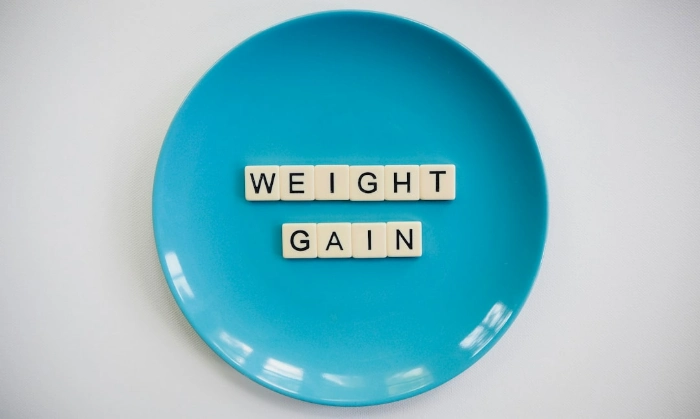Perimenopause and Sudden Weight Gain: How to Reverse It

At 49 years old, I entered perimenopause. I knew it was coming— the missed periods, swollen joints, some mild mood swings. But I wasn't quite prepared for the sudden weight gain that came on so swiftly that it caused my skin to hurt and my clothes to bust at the seams.
I've always been a workout girl. Some may have called me a gym rat in my younger days. In my 20s and 30s I was a certified aerobics instructor, personal trainer and Pilates instructor before Pilates was cool. I worked at several gyms, spas, and health clubs. I even worked for a local hospital helping cardiac patients with rehab. I had always been fit and strong, so when menopause hit me in my late 40s, I was unprepared for the sudden weight gain. Within a few short months, I gained 30 pounds.
This sudden weight gain scared the heck out of me. I hadn't changed my lifestyle— I was working out faithfully every day and eating the foods that I knew made me feel great– proteins, veggies, no junk food or sweets. But the weight kept piling on. So the personal trainer in me went to work. I trained longer, harder, and twice a day. I tweaked my diet even more. Surely this would work! Nope. I kept gaining weight, not just in my midsection, but everywhere— my hips, behind, legs, even my feet started to swell like balloons. My shoes felt tight and uncomfortable. Heck, everything I tried to wear was tight and uncomfortable. Figuring out what to wear to my job as a high school teacher had become impossible. Nothing fit, nothing felt good, and nothing looked put-together. I was miserable.
The misery continued. One day, I was teaching at the front of my classroom when my pants ripped— a clean split right near the front pocket. That's how bad things were getting.Thankfully I was wearing a longer tunic-style shirt, so no one knew what had happened but me. But this was getting ridiculous. More importantly, I was terrified for my health. I knew a major weight gain was super unhealthy, but I had no idea how I was going to reverse this. The old ways didn't work anymore. It seemed like the more I trained and the healthier I ate, the worst things got. This went on for almost a year. It felt like the longest, most painful year of my life.
While I'm not into taking prescriptions for the long term, I had to do something so I asked my doctor. After sharing my story with her, she replied, “Eat less, move more.” No, you didn't hear what I said. I already tried that. She explained (in a rather condescending tone) that “as we age we don't move as much, so we don't need as much food.” I really couldn't believe that THAT was the advice I was getting. But there it was, and I left her office feeling even more helpless and hopeless. I headed back to work— I was teaching a summer test prep course in the afternoons. I promptly gave my students a set of practice questions, sat down at my desk, turned on the fan, and stuck my face directly in front of it. I think my tongue was hanging out like Lassie’s! My coworker came by to ask a question, took one look at me, and whispered, “Oh, no! Are you sick?” No, I'm just fifty years old. Yes, that day was my 50th birthday, and menopause was wreaking havoc on my life. I saw no way out.
But I'm never one to give up completely, so as I sat in front of that fan, my mind raced to find a solution. There must be a way to reverse this, or at least start feeling better. I went home that afternoon and started researching… menopause weight gain. The internet searches mostly pointed to hormone replacement therapy and keto diets (been there, done that, didn't work for me), but then I saw some information about intermittent fasting and menopause. This was a new and unexpected discovery! As I read about intermittent fasting, I realized that it was simple and FREE. It wouldn't be easy, but it was doable and within my budget.. I could start tomorrow. I figured I had nothing to lose. The very next day, I began fasting for 20 hours straight. Then, at 4:00 p.m., I had a snack, and at 6:00 p.m. I had dinner with my husband. I made sure that I stopped eating by 8:00 p.m. Then I did it again the next day. And the next. By the third day, I started feeling better. Some of my joint pain and swelling started to go away. This was amazing! I kept going with the intermittent fasting for 20 hours every day. After a few weeks, my clothes felt looser. In fact, I felt more comfortable in ALL of my clothes. My shoes fit again. It was working! After several months, I looked and felt like the old me. Intermittent fasting for 20 hours was the key to losing my menopause weight gain!
Dear Reader, if you've read this far, you can probably relate to my menopause angst. I hate that you are having these experiences too. I'm guessing you've also tried everything. If you haven't tried intermittent fasting for your menopause symptoms, you might consider it. Do your own research. It might work for you too. Whether you decide to try intermittent fasting or not, I hope you find what you are looking for. I hope you find the results you seek to live happier, healthier, and pain free!
To your health,
Jennifer Kaye
